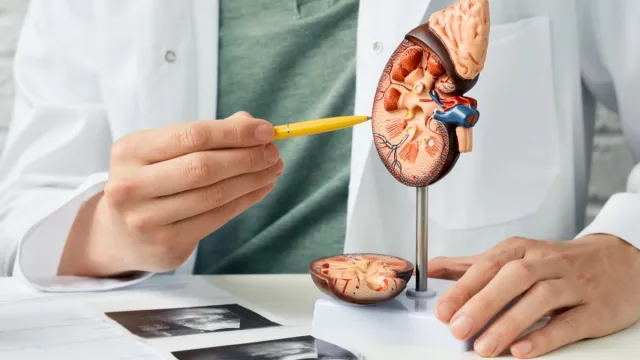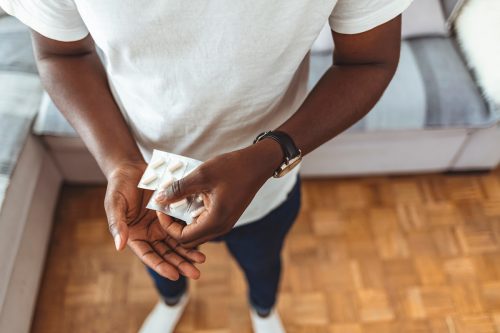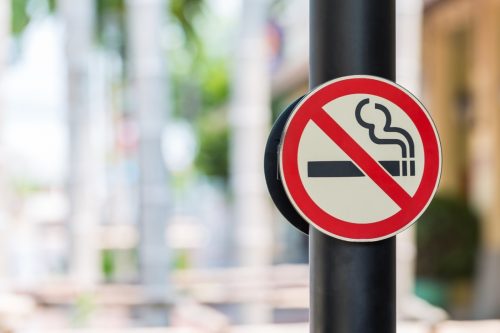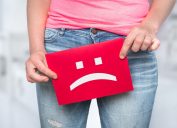5 Habits That Could Be Damaging Your Kidneys, According to Doctors
Keeping these organs healthy is vital to your overall well-being.

If you're like me, you don't spend a lot (or, um, any) time thinking about your kidneys. In fact, many of us only have the vaguest idea what our kidneys actually do—we just know we need at least one of them in order to live. For a more technical explanation, Best Life turned to nephrologist Kalyani Perumal, MD, Medical Director of Dialysis, Renal Diseases Department at Cook County Health.
"Kidneys are bean-shaped organs located in the upper part of the back of the abdomen, and they play a crucial role in maintaining our health and well-being," Perumal says, noting that the kidneys' main job is removing waste from our blood, which is then excreted in our urine. "In addition, they produce very important hormones to stimulate new red blood cells and maintain bone strength," she explains. "They [also] play a vital role in water balance, and regulate the levels of important minerals in our body like sodium, potassium, and calcium."
Perumal says kidney disease is one of the fastest-growing epidemics in the U.S., with one in three adults at risk of developing the condition. "About 37 million American adults have kidney disease and most are unaware of it," she says. "Kidney disease is often referred to as a 'silent killer,' as many do not have any symptoms until it has reached late stages."
Could you be hurting your kidneys without even knowing it? Read on for five common habits that could be putting these vital organs at risk, so you can start taking better care of them today.
READ THIS NEXT: Margaret Cho Went Into Kidney Failure on Set After Being Pressured to Lose Weight.
1
Not drinking enough water.

You probably already know that staying hydrated is key to good health—and that includes your kidneys.
"One common habit that can damage the kidneys is not drinking enough water," says board-certified family physician Laura Purdy, MD. "Dehydration can lead to the buildup of toxins in the body, which can put a strain on the kidneys. It is essential to drink enough water to keep the body hydrated and help the kidneys flush out waste and toxins."
If you're thirsty, then your kidneys are, too—so drink up!
2
Eating too much salt.

"Another common habit that can damage the kidneys is consuming too much salt," Purdy says. "Salt can cause high blood pressure, which can put a strain on the kidneys."
Perumal recommends eating a diet rich in fiber, such as fruits and vegetables, and limiting both salt and fat. "Limit animal protein and substitute with plant-based protein in your diet, particularly if you are at risk of developing kidney disease," she tells Best Life. "Choose low-salt options, and use herbs for increasing the flavor of the foods. Try to cook your own foods so you can choose the ingredients that are beneficial to you. Rinse canned meats, vegetables, and fish with water before eating. Pay attention to the nutrition fact labels and select foods that are low in salt and fat."
She says practicing mindful eating—focusing on the flavor of your food and avoiding distractions—can boost not just your kidney health, but your overall wellness.
3
Taking painkillers regularly.

Whether you've got a headache, a backache, or some other nagging complaint, popping an Advil or Tylenol can knock it out like magic. That's why many of us keep a bottle handy, relying on it for everyday use. However, it's best to avoid actually taking it every day, Purdy and Perumal agree. "Over-the-counter pain medications such as ibuprofen and acetaminophen can cause damage to the kidneys if used excessively," says Purdy. "It is important to follow the recommended dosage and not use these medications for extended periods."
Perumal adds that home remedies can be dangerous, as well. "Over-the-counter painkillers and herbal preparations can cause severe kidney injury, particularly in people having diabetes and high blood pressure," she explains, urging readers to consult their healthcare provider before taking any medication or nutritional supplement.
For more health news sent directly to your inbox, sign up for our daily newsletter.
4
Smoking.

It's not news that tobacco use is bad for you, but in case you weren't crystal clear on that fact, Purdy and Perumal are happy to tell you again. "Smoking can cause high blood pressure and damage the blood vessels, leading to decreased kidney function over time," says Purdy. "Quitting smoking is crucial for overall health, including kidney health."
"High blood pressure and diabetes are the leading causes of kidney disease in United States," Perumal says, adding that "smoking causes various toxins to enter the body and is a risk factor for various cancers in the body." If you're struggling to quit, she encourages you to call the national quit line at 1-800-QUITNOW (1-800-784-8669) for help. "You are not alone!"
5
Not managing your stress.

Stressed out? Join the club. A 2022 poll sponsored by the American Psychological Association (APA) found that "a majority of adults are disheartened by government and political divisiveness, daunted by historic inflation levels, and dismayed by widespread violence." The APA wrote that people in the U.S. are "facing a barrage of external stressors that are mostly out of personal control."
What does that have to do with your kidneys? Plenty, says Perumal. "Chronic stress leads to various medical conditions like high blood pressure, diabetes, and mental illness, which negatively affect kidney health." She recommends stress-reduction methods such as deep breathing, practicing mindfulness, and making time for gentle exercise like yoga, chi-gong, and tai-chi. "Self-care is very important in your daily routine," she says. "Take 10 minutes out of your daily life just for your self-care."
Best Life offers the most up-to-date information from top experts, new research, and health agencies, but our content is not meant to be a substitute for professional guidance. If you have health questions or concerns, always consult your healthcare provider directly.





















